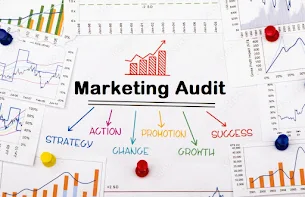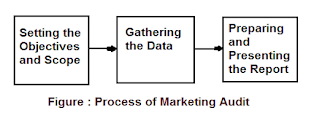What is Marketing Audit ?
Marketing audit can be understood as the on-going, systematic and objective study of analyzing the efficiency of marketing activities of a firm. Different types of marketing activities and policies can be types analysed effectively with the help of marketing audit along with determining the amount and direction of the firm's growth. The main focus of a marketing audit is on analyzing the long-term interest and challenges of a firm rather than focusing on its short term goals and accomplishments.
One of the essential constituents of marketing planning process is marketing audit. These audits are implemented when the process of marketing planning starts and is also done at different points during the implementation phase of the marketing plan. Analysis of different types of internal as well as external impacts on marketing plans along with their reviews is done under the marketing audits.
Definition of Marketing Audit
According to Harwood Merrill :
"Marketing audit is a systematic, critical, and impartial review and appraisal of the total marketing operation".
According to Schoell :
"Marketing Audit is a comprehensive review of the organisation's overall marketing performance and prospects".
There is no such company which is completely sure that all the marketing operations and functions are perfectly fine. It is important for the firms to analyse that the plans, programs, marketing policies, systems and methods designed in the past are still significant or not. Also, it needs to check whether such plans have any role in the future or not. All these concerns can be addressed with the help of marketing audits.
Types of Marketing Audit
There are mainly six important components of marketing audit which must be analyzed for the company's marketing position. These are as follows :
1) Marketing Environment Audit :
In this kind of audit, various macro-environment forces (which have the capacity of influencing the company's business operations) and important patterns in the vital component of the firm's task environment (such as customers, competitors, distributors, dealers, facilitators, markets, etc.) are thoroughly analyzed.
i) Macro-Environment Audit :
Under this audit economic environment, cultural environment, demography, technology, and political environment are analysed.
ii) Task Environment Audit :
Under this audit, public, customers, competitors, facilitators, distributors, dealers, suppliers, and other marketing firms are analysed.
2) Marketing Strategy Audit :
In this type of audit, the firm's marketing objectives and strategies are thoroughly analysed in order to understand their adaptability to the existing and forecasted marketing environment. Following aspects are included in it :
- Business mission
- Marketing objectives & goals
- Strategy
3) Marketing Organisation Audit :
Under this type of audit, the capabilities of a marketing organisation are analysed for developing and conducting various important strategies for the predicted marketing environment. The following aspects are covered in it :
- Formal structure
- Functional efficiency
- Interface efficiency
4) Marketing Systems Audit :
In order to determine the significance of innovations, analysis, planning and controlling of a firm in the marketing area, this audit is conducted. With the help of this audit, different activities of business. can be analysed very closely. The different aspects which are included :
- Marketing Information Systems
- Marketing Planning Systems
- Marketing Control Systems
- New Product Development Systems
5) Marketing Productivity Audit :
Under this audit, analysis of data on the profitability of various marketing elements is done along with the cost effectiveness analysis of various marketing expenses. The different aspects of this audit are :
- Profitability analysis
- Cost-effectiveness analysis
6) Marketing Function Audits :
In this audit, an in-depth analysis of important elements of marketing mix is conducted. The different aspects of this audit are :
- Products
- Place (Distribution)
- Price
- Promotion
- Sales Force
Features of Marketing Audit
The marketing audit characteristics are as follows :
1) Comprehensive and Functional :
The marketing audit can be seen as comprehensive (horizontal) audit and functional (vertical) audit :
i) Horizontal Audit :
The complete marketing performance of a firm with certain importance to interrelationship of different variables and their relative significance is studied under horizontal audit. Tracking a process from one end to other end is the main activity performed under this audit. The firm's marketing environment, organisation, systems, strategies and objectives are included in the horizontal audit. It mainly deals with the optimization of available resources so that the total effectiveness of marketing efforts can be maximized.
ii) Vertical Audit :
When a detailed analysis of a single aspect of the company's marketing strategy (such as product planning) is done, it is regarded as vertical auditing. In this type of auditing, all the dimensions of data protection system are checked within a certain area, function or department. It is important to title the vertical audit with a name according to the activity being audited as it mainly deals with a certain function of the marketing mix at one time.
For example, advertising audit, sales force audit, pricing audit and so on.
2) Systematic :
A marketing audit is performed systematically by following certain steps. The utility of any marketing audit depends upon the amount by which different orderly sequences are followed in the diagnosis of various steps including marketing environment, certain marketing activities and internal marketing system of a firm. A corrective action plan must be implemented after the diagnosis which should include both short-term and long-term actions by which the overall marketing effectiveness of a firm can be significantly improved.
3) Independent :
Marketing audits are of independent nature as there are mainly six methods by which the marketing audit can be conducted :
- Self-audit
- Audit from across
- Audit from above
- Firm auditing office
- Firm task-force audit
- Outsider audit
4) Periodic :
When audits are conducted periodically, companies gain a healthy competitive position in the market. Most commonly, whenever the sales of a firm decrease rapidly, either various marketing problems arise or the morale of sales force gets substantially decreased. In such situations, different types of periodic marketing audits are conducted.
Process of Marketing Audit
There are mainly three simple steps in conducting the marketing audit which are elaborated as below :
1) Setting the Objectives and Scope :
Conducting a formal meeting between the potential auditor and the firm's managers will be the first step of marketing audit. The main purpose of this meeting is to find out the nature of marketing operations and potential value of marketing audit. If the potential advantages of conducting a marketing audit are quite substantial for a manager then an arrangement has to be worked out between managers and auditor about the objectives, depth, data source, time period, coverage and audit's report format.
2) Gathering the Data :
One of the most time consuming activities for an auditor is data collection. In large projects, a team of auditors is involved rather than a single auditor, nevertheless, the term 'auditor' is used for representing group of auditors. In order to control the auditing time and costs, a detailed plan has to be formed in order to determine who will interview whom, questions to be asked, where and when to conduct this activity and so on. All the interviews are needed to be documented in writing and properly reviewed so that different areas of data collection can be identified during the data collection process. The basic principle of auditing is that the team should not be completely dependent on the individuals being interviewed for collecting data. The most important group which is to be interviewed is customers as the perception of the customers about a certain firm and its competitors is not known to many marketers.
3) Preparing and Presenting the Report :
After different types of data are collected, a tentative report will be prepared by the auditor Conducting a meeting twice or more between the auditor and marketer before the completion of data collection is a common practice for determining the reaction and suggestions of managers. In order to present the findings to the managers or small group of individuals who hired the auditor, a visual and verbal presentation is usually prepared by the auditor. Restatement of objectives, presenting the main findings, and proposing vital recommendations are the main parts of this presentation. the final After this, the report is prepared by the auditor which is mainly a report written in a formal manner consisting of visual and verbal materials. This report will be submitted to other groups of the company rather than submitting it to the managers. The most significant part of an audit report is the process which is going to be initiated by managers in debating and developing their concepts regarding the required marketing actions.
Areas to be Investigated in Marketing Audit
The areas that need to be investigated in a marketing audit include :
- Factors that have created either a positive or negative impact on the firm in recent years. These factors also involve unexpected competitors' actions or any change in the marketing environment, which have the capability of affecting the outcome of a marketing programme.
- Level of customer satisfaction of targeted group of customers.
- Satisfaction level of vendors, distributors, and intermediaries.
- Attitudes, marketing knowledge, and satisfaction level of all officials involved in function of marketing.
- The level by which the marketing of the marketing program was done internally and supported by top management and non marketing executives.
- The accuracy level of every decision made under marketing mix such as targeting. positioning, pricing, advertising, etc.
- The performance of sales force, advertising. promotion and marketing research programmes with their main focus on return-on-investment.
- Checking whether the stated financial and non financial goals and objectives were accomplished by the marketing plans.
- Different dimensions of marketing plans which became unsuccessful in achieving the goals along with providing suggestions to improve future results.
- Customer equity and current value of brands in the portfolio of the products.
Benefits of Marketing Audit
The advantages or importance of marketing audit are described as below :
1) Providing a Comprehensive View :
The in depth analysis of marketing activities being conducted in any firm can be done with the help of marketing audit. It presents a clear picture of all the marketing operations. Various demerits and improvements in efficiency of the firm can be identified by conducting a proper marketing audit. An improved marketing plan can also be developed with the help of this process.
2) Reforming Business Practices :
Different types of business practices of a firm can be reformed, which can result in improved profitability and overall productivity.
3) Ensuring Correct Actions :
Marketing audit assures different managers, investors, and top management that correct functions are being performed or not. This is essential to make sure that the firm is in aligned with the right rack of growth.
4) Developing Effective Business Planning :
Different types of marketing activities and outcomes are critically examined and analysed. with the help of marketing audit. Various guidelines are provided for measuring the business performance and ensuring effective business planning so that more demand can be generated and positive external perception can be improved.
5) Determines Value of Sale :
The values of sales and sales lead can be determined through marketing audits.
6) Provides Provisional Report Card :
Marketing is an activity which includes no permanent right answers. Different targets are modified on the basis of customer's needs and the testing or re testing of marketing plans is conducted in order to determine the most suitable and profitable composition. In order to support the firm and their staff, a provisional report card is provided by the marketing audit for attaining higher success.
7) Strategic Marketing Change :
Strategic marketing changes are implemented when effective marketing audits are conducted. The direction of the firm can be re-analyzed by determining the changing environment, competitors, channels and customers.


